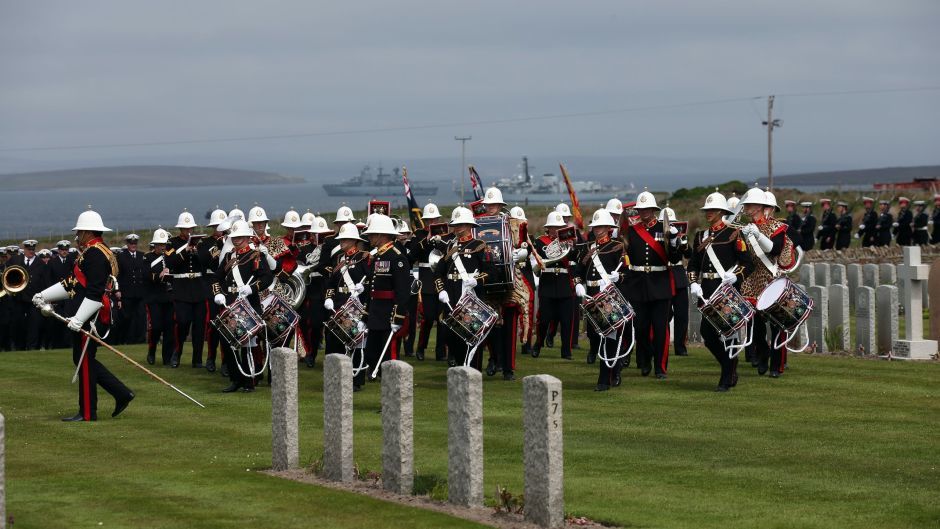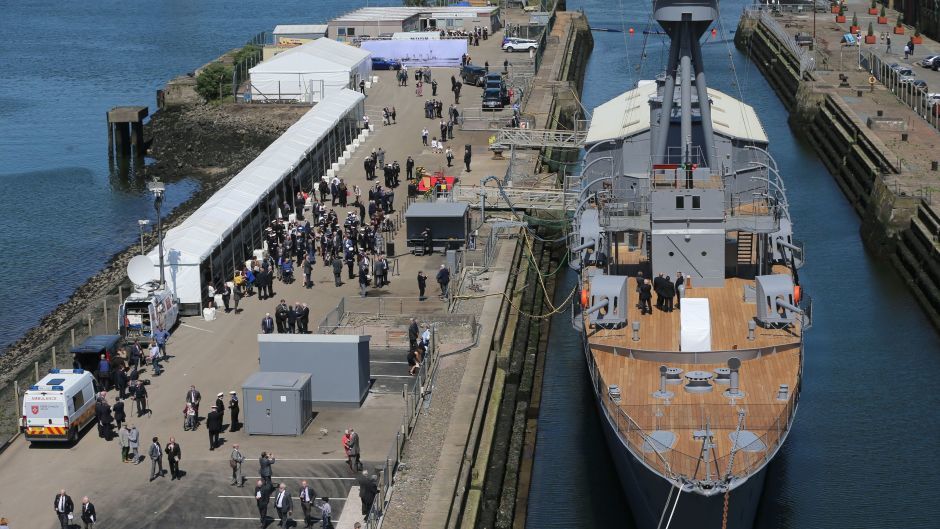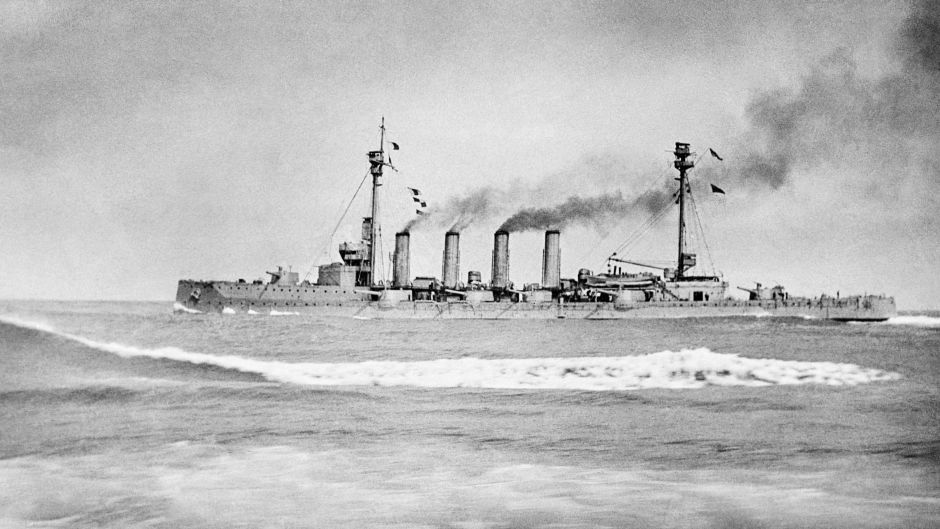One hundred years ago to the day, they were intent on obliterating each other in the middle of the North Sea.
But today, British and German descendants of the sailors who fought at the Battle of Jutland joined forces to honour those who fell.
Welcomed by a waterfall of poppies cascading from the Weeping Window at St Magnus Cathedral in Kirkwall, they gathered for a remembrance service conducted in English and German.
At its heart was the theme of reconciliation in recognition of the now peaceful relationship between the two nations.
Side by side, one after the other, serving personnel in both the Royal Navy and Federal German Navy recited excerpts from contemporary accounts, bringing to life those dreadful scenes of 31 May and 1 June, 1916.
Signaller Charles Farmer, one of only two survivors from the crew of HMS Indefatigable, recalled: “There was a terrific explosion aboard the ship – the magazines went. I saw the guns go in the air just like matchsticks.
“Within half a minute the ship turned over and she was gone.”
In another description, German sailor Richard Stumpf, who was aboard SMS Helgoland, recounted the eagerness for information of the men below deck, who “bombarded” him and the other lookouts with questions.
“Those who had witnessed the battle had to repeat the entire story over and over until all of the men were satisfied,” he recorded.
Yesterday – in the participants’ own powerful words – it was repeated once more; a century later it is not forgotten.
The strains of a lone piper drifting through the 12th century structure heightened the emotion of the occasion, which also featured music from the Band of HM Royal Marines and a Marinemusikkorps Kiel brass ensemble, who accompanied the cathedral choir.
Among the pieces performed was a specially commissioned composition, The Golden Solstice, by late composer and Orkney resident Sir Peter Maxwell Davies, as well as the naval hymn concluding with the poignant line: “Oh, hear us when we cry to Thee, For those in peril on the sea.”
The service, led by cathedral minister the Reverend Fraser Macnaughton with contributions from both British and German naval chaplains, culminated with the lighting of a candle symbolising remembrance and hope.
Joining the descendants for the ceremony in Britain’s most northerly cathedral, were David Cameron and Nicola Sturgeon as well as German President Joachim Gauck and the Princess Royal, clad in a navy uniform.
She was due to be accompanied by her father the Duke of Edinburgh, but he was forced to miss the event after advice from his doctor.
In a foreword for the order of service, he wrote: “War may be senseless and the Battle of Jutland may have been inconclusive, but there can be no doubt that their sacrifice was not in vain.”
More than 100,000 sailors on 250 warships were involved in the battle, which took place over 36 hours about 80 miles west of Denmark.
Regarded as the only full-scale naval clash of World War I, some 8,500 souls lost their lives – about 6,000 British sailors and 2,500 Germans.
By the time the battle was over the Royal Navy had lost 14 ships, including three battle-cruisers which blew up. The Germans lost 11 vessels, but just a single capital ship.
There was no decisive victory for either side, although both claimed triumph. While the British lost more ships and men, the German High Seas fleet never again seriously threatened British naval superiority in the North Sea for the rest of the war.
Orkney was chosen for the focus of the commemorations as its vast natural harbour at Scapa Flow was home to the Grand Fleet.
As well as the event at St Magnus, there was a remembrance service at Jutland Bank where a German navy frigate joined a British ship to scatter poppies and forget-me-nots, the German flower of remembrance.
A wreath was also laid at the Royal Naval Cemetery in Lyness on Hoy.
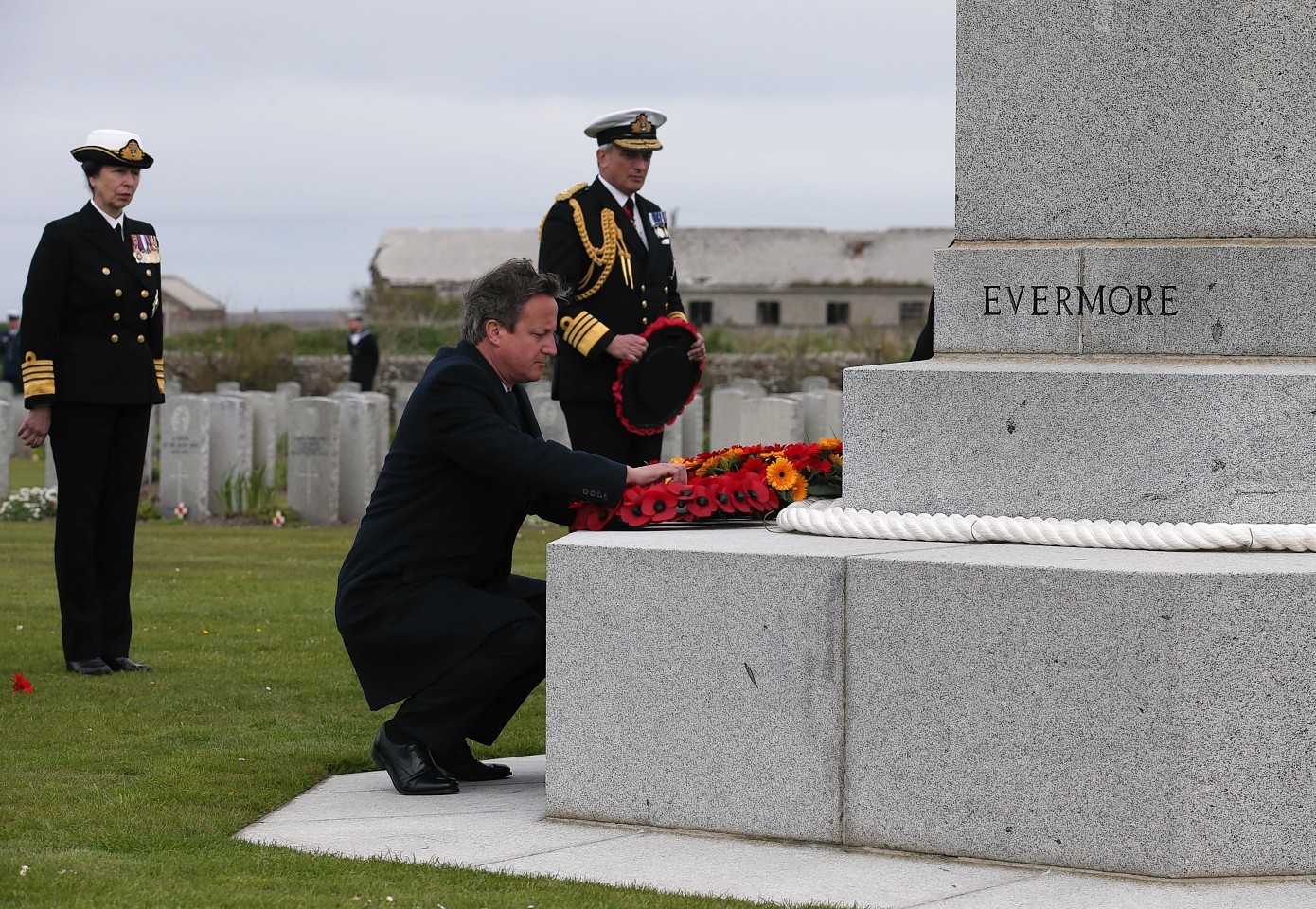
Proud of modern Europe
The descendant of a German sailor who fought at the Battle of Jutland said yesterday his great-uncle would have loved to have seen Europe as it is now.
Rear-Admiral Franz Mauve commanded the II battle squadron of the Hochseeflotte – High Seas Fleet – during the naval clash.
It was the target of British destroyer HMS Faulknor and he lost more than 800 men when SMS Pommern was hit by a torpedo, causing the stored ammunition to explode.
The ship burst in the middle and sank quickly, killing all its crew.
Between October 1911 and September 1913, Mauve – 51 at Jutland – had served as its commander.
Dr Malte Probst-Freiherr von Müffling, 45, told the Press and Journal his great-uncle would have appreciated the centenary commemorations.
He said it was important to acknowledge the service of those involved and help to increase awareness that war cannot be a solution.
He added: “We are a very international family. He would like to see Europe as it is now, as the EU, where we can be happy and live peacefully together.
“For us as a family, it’s important that we have freedom in Europe, that Europe is united as it is.
“We are a European family and appreciate the value of a peaceful and united Europe.”
The engineer, who is married with two sons and lives in Siegen near Cologne, did not meet his mother’s uncle who died in Berlin in 1931.
But he said he had heard many stories about Mauve, who was born in a Silesian town, now situated in Poland, in 1864, from his grandfather.
The father-of-two added: “He had a Prussian mentality – duty first and discipline. But on the other hand he was a sailor and, let’s say, he had a sense of humour.”
There is a family story about Mauve’s service on SMS Victoria Luise, which pre-dated his action at Jutland.
During that time, he experimented with new radio technology which was not always reliable.
Dr Probst-Freiherr von Müffling, who was unable to attend yesterday’s commemoration in Orkney, said every time they managed to establish a connection, a Schnapps was downed.
After one particularly successful day, he came home to his wife with a “big smile on his face”, he joked.
Mauve started his career in the Kaiserliche Marine – the Imperial German Navy – in 1886 and by Jutland had risen to the rank of rear-admiral.
At the battle, his squadron was made up of older ships, which were slower and restrained their more modern counter-parts.
The 839 seamen who died when SMS Pommern was hit made up about a third of all German losses.
In November 1916, Mauve was put in charge of the IV battle squadron in the Baltic sea, before retiring the following year.
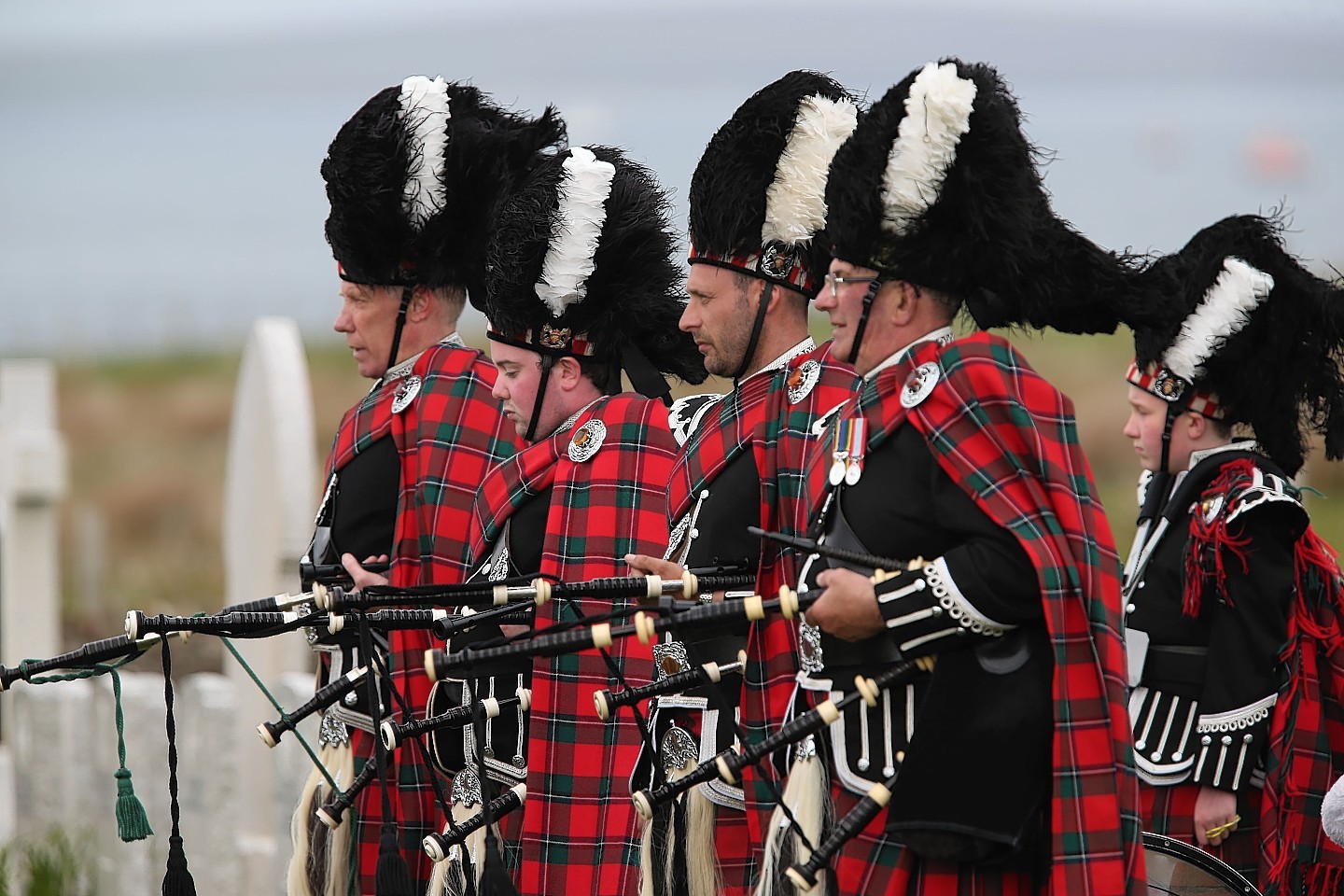
Commemoration
The closest location on land to the main site of the Battle of Jutland has commemorated its centenary with salutes fired from one of the guns used in 1916.
Gunfire was heard again overnight in the Danish fishing village of Thyborøn, around 90 miles east of where the action ensued 100 years ago, and continued this morning.
Today, a trumpet fanfare was sounded to signal the start of the battle, followed by a gun salute by the Royal Danish Navy.
A gun salvaged from the light cruiser SMS Rostock – after 100 years at the bottom of the North Sea – then took over.
It fired at the exact time each of the 25 ships that were lost went down – until 9.45am today when HMS Sparrowhawk was sunk.
A memorial park for the 8,645 victims is also being opened, on the dunes next to the village’s Sea War Museum.
Stone figures representing the men who died – many of whom washed up on Scandinavian shores – are being erected around 26 granite pillars.
These obelisks, formed like a ship’s bow, mark each one that was destroyed, with the 26th standing for the 600-plus sailors killed on vessels that survived Jutland.
The battle was not visible from the Danish coast, but the thunder of guns could be heard.
Rostock was scuttled by its own crew at 5.25am on June 1 after a serious torpedo hit from a British destroyer.
Prior to that, it had fired about 500 shots from its 4-inch guns. It was one of these that was salvaged and used for the commemorations.
The park covers an area of 20,000 square metres and, in the fullness of time, all 8,645 sailors who perished will be honoured with their own sculpture.
So far, some 170 have been raised.
It is being officially opened by Nick Jellicoe, grandson of Admiral Sir John Jellicoe, and Reinhard Scheer-Hennings, grandson of his German counter-part Admiral Reinhard Scheer.
Both attach great importance to the fact that the memorial makes no distinction between German and British sailors.
This evening a remembrance service has been held in the Church of Harboøre where a wreath was laid in the graveyard.
Battle of Jutland: The aftermath
There was disappointment in the aftermath of the Battle of Jutland that it had not been a victory akin to Nelson’s decisive win at Trafalgar.
As the recriminations began, Vice Admiral Sir David Beatty was among those to receive blame.
But yesterday, his grandson Nicholas Beatty – in Orkney for the commemorations – defended his record, hailing both his achievement at Jutland and long-term career.
He described his grandfather – a charismatic and dashing figure known for wearing his hat at the famous Beatty tilt – as an “easy person to challenge” by those he was promoted over with an “axe to grind”.
Admiral Sir John Jellicoe, who never again took part in operations at sea, was also criticised after the battle for being overly cautious.
In contrast, Beatty – the man who succeeded him as commander of the Grand Fleet – has generally been portrayed as a more aggressive and even reckless tactician.
His battle cruisers took more hits than their German counterparts during the battle, reportedly prompting him to declare: “There seems to be something wrong with our bloody ships today.”
It has been characterised as a frustrating encounter, because he never managed to gain an advantage over the Germans.
Historian Dr Stewart Fraser, of the University of the Highlands and Islands, believes that the battle cruiser action, which Beatty commanded, has to be classed as a tactical defeat for Britain.
He does, however, acknowledge Beatty did what was expected of him at Jutland in leading the High Seas Fleet towards the German guns.
Picking up on this point, Nicholas Beatty told the Press and Journal: “There was a hoo-haa after the war for various reasons.
“The British public were expecting to see another Trafalgar, but it was a very different type of war.”
He also underlined the continuing dominance of the Grand Fleet in the North Sea under his grandfather until the end of the conflict.
Beatty was subsequently promoted to admiral, then admiral of the fleet and later became first sea lord.
His descendant added: “It was very easy for people to say I would have done it this way or that.
“He was an easy person to challenge in the sense he was very rich, he was very self-assured and he was the youngest admiral since Nelson.
“There were a lot of people, officers in the Navy whom he had been promoted over, who had an axe to grind.”
Welcoming the centenary commemorations, he went on: “It’s a tribute not just to his service, but the service of all the men who fought and lost their lives in the Royal Navy, Merchant Navy and fishing fleets.”
Beatty kept a silver biscuit box that had been in Nelson’s cabin at Trafalgar on board his flagship HMS Lion at Jutland.
It has been lent to the National Museum of the Royal Navy for its 36 Hours exhibition.
*Jellicoe’s grandson Nick Jellicoe previously told the P&J his grandfather held a private sense of bitterness about how he was treated after the “misunderstood” Jutland battle.
He was, however, made a member of the Order of Merit and created Viscount Jellicoe of Scapa.
